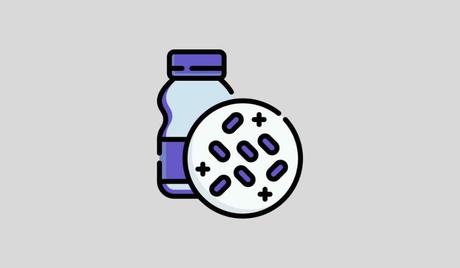Probiotics are a proven and clinically-backed way to improve digestive health and lose weight. But taking the right amount is key to making it effective. Here’s a look at how many probiotics you should be taking.

If you’re just starting to take probiotics for the first time, you may be confused on the dosage.
Of course, the amount of probiotic varies per strain, per person, and per condition you’re looking to treat.
If you look at the label you may see things like “5 billion CFUs” and have no idea what that even means.
That’s okay, because you’re about to learn all that and more right now.
In this guide, we will cover the basics of supplementing with probiotics, dosage, frequency, and more.
Let’s jump right in.
Probiotics – The Basics
First, we need to discuss what probiotics actually are.
They’re live microorganisms that provide health benefits when consumed or applied, typically by improving gut flora.
In each one of our bodies, we have both “good” and “bad” bacteria.
When there’s an overabundance of bad bacteria, it can knock our bodies out of balance, causing infections, or even chronic conditions.
Probiotics are an essential, healthy bacteria which help to protect our immune system and keep our bodies functioning efficiently.
Although research is ongoing, countless studies have shown that taking probiotics regularly can provide an array of different benefits to our bodies and minds.
Let’s go ahead and cover some of the biggest benefits of probiotics:
Balance Bacteria in Digestive System
Just mentioned up above, probiotics can restore our natural balance of bacteria in the gut.
Having an imbalance of too many harmful bacteria can lead to illness, poor diet, decreased energy levels, digestive discomfort, allergies, and more1.
Improve Mental Health
Here’s a fun fact for ya: the brain and the gut are intricately connected.
This is called the gut-brain axis, and you may have noticed that when you’re feeling anxious, your stomach gets tied in knots.
As probiotics have been proven to help our overall gut health, they can also have a great effect on our central nervous system (CNS) and even improve mental health.

More specifically, the bacteria can help improve anxiety, depression, autism spectrum disorder, stress, obsessive-compulsive disorder, and memory abilities2.
For these kinds of results, participants had taken probiotic supplements for 6 to 8 weeks, so mental benefits may not be seen immediately.
Reduced Severity of Certain Allergies
Allergic diseases seem to only be increasing among humans as time passes.
Depending on the exact disease and its severity, they can have a significant negative impact on one’s quality of life.
Probiotics have proven to be a promising supplement to help modulate the innate/acquired immune system.
Taking them can potentially improve not only the intestinal microflora, but cytokine secretion.
This affects entire networks of genes, TLRs, signaling molecules, and more.
One study discovered that eczema symptoms improved for infants given probiotic-supplemented milk, in comparison to those who were given milk without probiotics3.
Some strains may also help lower inflammatory responses in those allergic to milk or dairy, as well.
Weight Loss
If you’re having a hard time losing weight, probiotics may be able to give you the boost you need.
Weight loss through the help of probiotics actually works in a variety of ways.
For one, certain strains of probiotics prevent dietary fat from being absorbed in the intestine.

As it’s not being absorbed, our bodies get rid of it which means said fat will not be stored4.
A big part of weight loss means eating those foods we know we probably shouldn’t.
Sometimes cravings are just too strong, making them hard to resist!
As probiotics keep you feeling fuller, for longer, you’re less likely to have these cravings and you’ll eat less, overall.
While not all probiotics aid in weight loss, many can and do.
Probiotic Dosage – How Many CFUs Do You Need?
First off, it’s important to note that the correct dose of probiotics will depend on several factors.
The most important factor will be for which purpose you’re taking probiotics.
We’ll get more into that in a minute, but first, let’s talk about how probiotics are measured.
Probiotic dosage is measured in CFU, or “colony forming units.”
This term refers to the number of live microbes able to form colonies in lab testing, and tells you the viability of bacteria before they’re exposed to our acidic stomachs.
Probiotics as supplements can range widely, from millions to up to a whopping 200 billion CFUs!
Many national health agencies require at least one billion CFUs in order to be called a probiotic.
Most doses range from 1 to 10 billion CFUs, and they’re taken either once or twice per day, typically.
However, more doesn’t always equal better.
In fact, there are many times when lower doses have worked as well or even better than a higher dose, depending on the condition it’s being used to treat.

One condition that’s been studied in-depth in relation to probiotics, is antibiotic-associated diarrhea (AAD).
When antibiotics are prescribed, they have a way of reducing the harmful and beneficial bacteria in the gut.
When the good bacteria are reduced, this can result in AAD.
However, probiotics can restore this microbiota – avoiding or reducing the severity of AAD.
A 2015 analysis of over 20 studies determined that doses of 5 billion CFUs were significantly more effective in preventing AAD than probiotics taken at lower doses4.
However, once you get over 10 billion CFU per day, the effectiveness no longer increases.
The American Family Physician recommends children to take 5 to 10 billion CFUs of probiotics per day, while adults should take around 10 to 20 billion.
These numbers refer to the quantity of probiotics needed in order to maintain immune and digestive health.
Some studies suggest taking supplements with 50 to 100 billion.
However, if you’re not treating a specific issue, 10 to 20 billion CFU is likely more than helpful enough for maintaining everyday immune and digestive health.
Also, make sure to pay attention to the label of your probiotic.
See also: When is the Best Time to Take Probiotics?
Many supplement manufacturers list CFUs “at time of manufacture.”
What you need to know is exactly the quantity you’ll be getting before expiration.
While it’s not a rule, it’s almost always the case that as the product ages, the quantity of CFUs decreases.
Finally, pay attention to the product’s CFU makeup, as the CFU quantity listed on the packaging is usually the total of all probiotic types in the supplement.
How often should you take probiotics?
While the quantity of CFUs to take does vary per strain and for the purpose you’re using probiotics, the frequency at which you take them doesn’t vary as much.
Many wonder if probiotics are safe to take every day.
The good news is that yes, they’ve been shown repeatedly to be safe for healthy adults5 or daily and extended use.

If you have a severely compromised immune system due to an illness, taking probiotics may actually have a negative effect.
If this sounds like you, it’s best to consult with your physician before anything else to make sure they’re right for you.
Otherwise, for maximum results, you’ll want to take your probiotics on a daily basis.
It’s even better if you can take them at the same time every day.
Most people take theirs just before or with their breakfast or dinner, which can help form the habit.
Can you take probiotics more than once a day?
Research is still ongoing on the absolute ideal dosage for probiotics, as it also depends on the specific product.
For example, if you’re taking a probiotic with a significantly large CFU count, it may be best to do just once per day.
However, for lower CFU numbers, you may be better off taking them twice a day.
If you’re just starting out with probiotics, you’re probably best just going with once-a-day supplementation.
After all, taking too many probiotics can actually cause digestive discomfort and other unpleasant side effects.
You’re best going by the recommended use on the label of your specific supplement.
To make the most of your supplement, always store your probiotics in a cool, dry environment.
After all, they are made up of living organisms!
Storing them in your kitchen or bathroom cabinet could ensure they survive much longer.
If exposed to light, significant temperature changes, and/or humidity, their efficacy could be negatively affected.
If you’d like to keep them in a portable day-of-the-week pill organizer, try keeping a few days of servings there at a time, max.
If the label of your probiotic says they need to be refrigerated, make sure to do so as well.
The Bottom Line
Hopefully that cleared up most of the questions you had about taking probiotic supplements.
Again, there is a lot of variation when it comes to dosages, depending on the strain and what you’re using it for.
If you have any doubts, consult your physician and/or the probiotic manufacturer.
Probiotics offer a huge array of benefits, but you want to make sure to get the right dosage first!
More Probiotics Guides and Resources
8 Benefits of Probiotics for Athletes. Can probiotics improve athletic performance? Yes—here are eight reasons that athletes should supplement with probiotics.
How Long Does it Take for Probiotics to Work? Wondering if your probiotics are working? Or how long it’s going to take for them to start working? Here’s a detailed look at how long it takes for probiotics to work, signs they are working, and how to get more from your probiotics.
